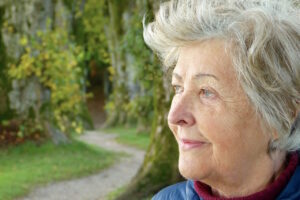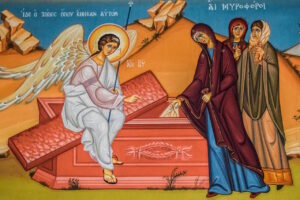Isaiah 35:1-6a, 10 (RM) or 1-10 (RCL); Psalm 146; James 5:7-10; Matthew 11:2-11.
Cousins.
The depth of the relationship between cousins can vary from nonexistent to very close. In my family I have both, if you count second cousins. There’s a good handful of cousins, lifelong friends, with whom I share meaningful memories. I have other cousins I remember from childhood and have rarely seen since. And then other cousins whose names I can barely keep track of, though I usually remember which parents they belong to. (A family tree can be a great help.)
So if Jesus and John the Baptist were supposed to be cousins, how come John doesn’t seem to have a clue who Jesus is? Even after baptizing him with great public praise and obsequious self-abasement. And after that greeting scene in which John’s mother greets Jesus’ mother with the startled remark that the baby in her womb just leaped for joy. (OK, to get this we have to mash together different types of stories from different Gospels.)
Anyway – why doesn’t John seem to know, or remember, who Jesus is?
We wouldn’t be the first ones to ask this question. Tertullian, an ancient church leader, pointed out that this passage in Matthew 11 shows that John doubted whether Jesus was the promised messiah – and Tertullian’s contemporaries tore a strip off him for daring to say that. A raft of other church fathers – Origen, John Chrysostom, Augustine – wrote off John’s doubts by claiming that he said this only for the sake of his disciples, not because he himself entertained any doubts. And that’s where the question was left through the ages. Only during the Enlightenment did some Protestant scripture scholars take a serious second look at John’s doubts about who Jesus was.
In any case, the writer of the Gospel of Matthew didn’t have a problem with it. In fact these verses 2-6 represent in story form a debate that took place, probably after Jesus’ resurrection, between the disciples of John the Baptist and those of Jesus concerning the nature of Jesus’ mission.
Matthew may have been setting up a deliberate contrast between John who expected the Messiah to come as a military leader exacting judgement and punishment right then and there, whereas Jesus’ re-casting of the question, both in its form and its content, illustrates how differently Jesus saw his own mission. In form, Jesus does not declare flatly who he is – he invites the questioners to look for themselves. “What do you see? Go and tell John.” He encourages them to use their own observations to draw their own conclusions. It’s like a foreshadowing of the motto, “See, judge, act” of 20th century Catholic social teaching.
The content of what they observe runs parallel to the vision of the Hebrew prophets such as Isaiah of the messianic times when, poetically speaking, deserts would bloom, weak hands would be made strong, physical limitations taken away, and all creatures would live in peace with and among each other.
Put simply, Jesus “did” messianic mission differently. He was not, as we know, the great military hero thrashing the enemies of Israel. In turn, those who model their lives after his would need to let go of any hope that some mighty hero figure would swoop down and force peace through violence. Authoritarian domination might look like a refuge from chaos and danger, but there’s a price to pay.
Jesus pointed those who questioned him, not toward himself, but toward the signs. Read the signs of the times. They’re right in front of you. Good on you if you’re not offended (the Greek word was “scandalized”) by this new model of leadership and peacemaking.
We, in turn, can look more closely, discern more carefully, to read the signs of the times in our own time. And those signs can pop up in the most unlikely circumstances, or the most unpromising people. Those who are poor, perhaps. Those who struggle with addictions or disadvantages. The person walking into traffic at the city street corner asking for a few coins before the light turns green.
Or our friends. Our neighbours. Our cousins.
© Susan K. Roll
Susan Roll retired from the Faculty of Theology at Saint Paul University, Ottawa, in 2018, where she served as Director of the Sophia Research Centre. Her research and publications are centred in the fields of liturgy, sacraments, and feminist theology. She holds a Ph.D. from the Catholic University of Leuven (Louvain), Belgium, and has been involved with international academic societies in liturgy and theology, as well as university chaplaincy, Indigenous ministry and church reform projects.




